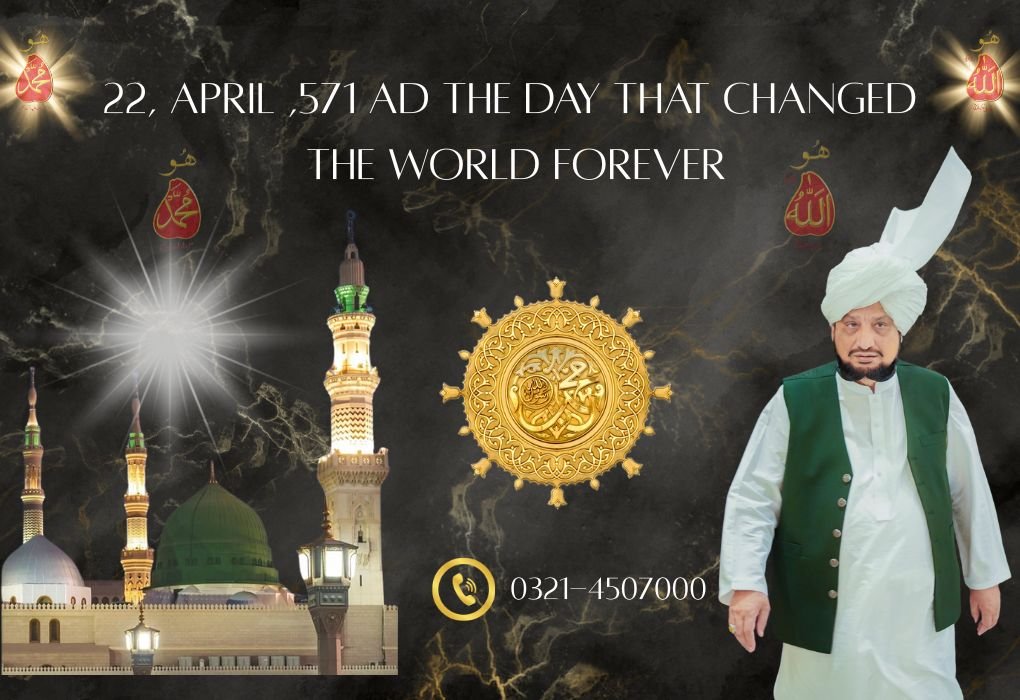Introduction
Few days in human history have had a lasting impact on the entire world. April 22, 571 CE, is one such day. It marks the birth of the beloved Prophet, the Seal of the Prophets, Hazrat Mohammad (Peace and blessings of Allah be upon him). This day is not only a blessing for Muslims but for all of humanity. In this blog, we will shed light on the historical importance of this day, the early life of the Prophet (Peace and blessings of Allah be upon him), its significance in Islamic history, and its relevance in the modern world.
April 22, 571 CE: A Historical Event
Prophet Mohammad (Peace and blessings of Allah be upon him) was born in the Year of the Elephant, the year when King Abraha of Yemen attempted to destroy the Kaaba. According to most scholars, this event occurred in 571 CE. The Prophet (Peace and blessings of Allah be upon him) was born on the 12th of Rabi al-Awwal, which corresponds to April 22, 571 in the Gregorian calendar.
This day marked not just the birth of a great individual but the arrival of Divine mercy, guidance, and light for all of humanity.
The Birth of Prophet Mohammad (Peace and blessings of Allah be upon him): Beginning of Mercy
The Prophet (Peace and blessings of Allah be upon him) was born in Mecca into the respected Banu Hashim clan of the Quraysh tribe. His father was Hazrat Abdulla, and his mother was Hazrat Amina. His birth came at a time when society was engulfed in ignorance, injustice, idol worship, and moral decay.
His arrival was like a ray of light in darkness, guiding humanity towards a noble path.
Early Life of the Prophet (Peace and blessings of Allah be upon him)
Key Highlights
- Childhood: He was raised as an orphan. His father passed away before his birth and his mother died when he was still young.
- Youth: Known as Al-Sadiq (the truthful) and Al-Amin (the trustworthy), his honesty in trade and dealings set him apart.
- Marriage: He married Hazrat Khadijah (RA), who was his biggest supporter.
- Prophethood: At age 40, he received the first revelation in the Cave of Hira, marking the beginning of his prophethood.
Importance of April 22, 571 in Islamic History
This date is one of the most important in the Islamic calendar, as it marks the birth of a leader who:
- Ended social injustice
- Opposed slavery
- Elevated the status of women
- Taught values of ethics, justice, and love
- Practically demonstrated the essence of Faqr (spiritual poverty and reliance on Allah)
Faqr and the Seerah of Prophet Mohammad (Peace and blessings of Allah be upon him): A Detailed Insight
In literal terms, “Faqr” means poverty, but spiritually it signifies complete dependence on Allah and detachment from worldly possessions. In Sufi tradition, Faqr is the highest spiritual state where the seeker needs nothing but Allah.
The Prophet (Peace and blessings of Allah be upon him) not only spoke about Faqr but lived it. Days would pass without food in his household, yet he never complained. He presented Faqr as an honor, stating:
“Al-Faqru fakhri” (Faqr is my pride) — [Hadith]
This spiritual Faqr is not weakness but the highest degree of closeness to Allah. It liberates one from the ego and worldly attachments and strengthens the soul’s connection with the Divine.
Key Traits of Faqr in the Prophet’s Life:
- Contentment: Being satisfied with whatever Allah provides
- Trust in Allah: Relying solely on Allah in all circumstances
- Detachment from materialism: Leading a simple life
- Generosity: Helping others even when having little
- Acceptance of Divine Will: Being pleased with Allah’s decisions
Spiritual Power of Faqr
Faqr elevates the soul and brings the seeker closer to Divine knowledge. It helps in understanding the true meaning of “La ilaha illallah” — not just verbally, but with heart and soul.
Sultan ul Ashiqeen and the Legacy of Faqr
In our time, Sultan ul Ashiqeen Hazrat Sakhi Sultan Mohammad Najib-ur-Rehman (RA) is spreading the true essence of Faqr-e-Mohammadi (Peace and blessings of Allah be upon him). He presents this complex spiritual path in a simple and practical way. Thousands have embarked on the journey of spiritual enlightenment under his guidance.
He says:
“Faqr is the only path that frees a person from worldly slavery and brings him into the servitude of Allah alone.”
Prophet Mohammad’s Birthday in the Gregorian Calendar
Most Muslims celebrate the 12th of Rabi al-Awwal as the Prophet’s birthday. This date aligns with April 22, 571 in the Gregorian calendar. The difference arises from the lunar and solar calendar systems, but the significance of the date remains unchanged.
What Message Does April 22, 571 Hold for Today’s World?
- Message of Peace: His life’s core message was peace and tolerance.
- Interfaith Harmony: He promoted justice, equality, and human dignity.
- Women’s Rights: He granted women their rightful place in society.
- Education and Morality: Made the pursuit of knowledge mandatory and emphasized ethical conduct.
- Teaching of Faqr: Through Faqr, he taught reliance on Allah and selflessness.
Conclusion
April 22, 571 CE, should not be remembered as just another date, but as the dawn of a spiritual revolution. The birth of Prophet Mohammad (Peace and blessings of Allah be upon him) is a beacon of light for all humanity, guiding lost souls toward truth and righteousness.
May Allah grant us the ability to follow his Seerah and embrace Faqr so we may find success in both worlds. Ameen.

